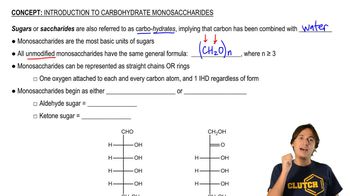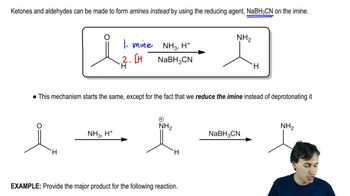Here are the essential concepts you must grasp in order to answer the question correctly.
Monosaccharides
Monosaccharides are the simplest form of carbohydrates, consisting of single sugar units. They serve as the building blocks for more complex carbohydrates. Common examples include glucose, fructose, and galactose. Understanding their structure and reactivity is crucial for studying their transformations, such as reductions to form alditols.
Recommended video:
Alditols
Alditols, also known as sugar alcohols, are produced by the reduction of monosaccharides. This process involves the conversion of the carbonyl group (aldehyde or ketone) into a hydroxyl group, resulting in a polyol. Alditols are important in various applications, including food and pharmaceuticals, and their formation from specific monosaccharides is key to understanding carbohydrate chemistry.
Recommended video:
Monosaccharides - Reduction (Alditols)
Reduction Reactions
Reduction reactions in organic chemistry involve the gain of electrons or hydrogen, or the loss of oxygen. In the context of carbohydrates, this typically refers to the conversion of a carbonyl group in a monosaccharide to an alcohol group, yielding an alditol. Recognizing the specific conditions and reagents that facilitate these reactions is essential for predicting the products formed from different monosaccharides.
Recommended video:
 Verified step by step guidance
Verified step by step guidance Verified Solution
Verified Solution



 7:19m
7:19m